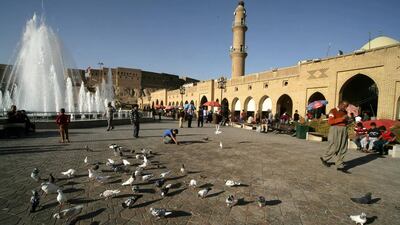Kurdish officials in northern Iraq on Monday struggled to contain public discontent over unpaid salaries and claims of corruption, using force and tear gas to break up peaceful protests across the region.
Until recently protests had been confined to opposition-controlled areas of the Kurdistan Region. But for the first time on Sunday, protesters gathered in the capital Erbil, a stronghold of the leading Kurdistan Democratic Party.
Some of those involved said they had taken to the streets despite the KDP’s longstanding policy of trying to prevent such protests. "This is very significant for Erbil,” said one teacher, who asked not to be named for fear of repercussions.
Protests continued in Erbil on Monday but were rapidly contained by security forces. “We were around 150 protesters,” the teacher said. “There were three times the number of security forces, in full riot gear."
For three years now the KRG has struggled to pay the salaries of its more than one million government employees. The high number of Kurds receiving a government salary — nearly a quarter of the population — has in the past dampened popular discontent towards the autonomous region’s leadership.
But growing anger over ongoing austerity measures and the failure to pay salaries could threaten the KRG, whose power has already been greatly rolled back by the federal government in the wake of a failed independence referendum in September last year.
The Iraqi federal government began halting payments to the Kurdistan Region in 2014, following a dispute over the Kurds' share of the federal budget and their right to export oil.
Since then the KRG has struggled to reduce its deficit, despite unilaterally selling oil in defiance of Baghdad. As a result the Kurdish government was forced in 2016 to introduced austerity measures, cutting public salaries by up to three quarters.
_______________
Read more:
Iraq sends money to pay Kurdish salaries for first time since 2014
Beyond the Headlines podcast: Iraq's reconstruction and the challenges ahead
Iraqi budget cut raises tensions with Kurdish region
Baghdad extends flight ban on Iraqi Kurdistan
_______________
But many Kurds believe corruption is also a factor in igniting the protests.
“They’re stealing our salaries and ... giving us [only] part of our salaries every two or three months,” said Yasa Ako, 23, a civil society activist protesting in Erbil.
In September last year Kurdish leaders banked on a successful referendum to placate their constituents and achieve a stronger negotiation position with the federal government.
Instead Baghdad vehemently opposed the move, shut Kurdish airspace to international flights and later seized large tracts of disputed territory formerly controlled by the Kurds, including oil fields around the city of Kirkuk.
With the loss of nearly half its oil production, the KRG was forced to re-enter negotiations with Baghdad in order to receive its share of the federal budget.
Earlier this month, Iraqi prime minister Haider Al Abadi announced he would lift the international flight ban on Kurdish airports and would send money to pay for KRG public salaries ahead of the Nowruz festival on March 20.
The KRG says Baghdad sent IQD 317 billion (Dh982.4 million) to pay salaries, but claimed it needs at least IQD 590 billion to pay its employees under its austerity salary programme. “It is a smaller amount than needed,” the KRG said in a statement promising to work to increase payments to its civil servants.
A KRG spokesperson was not immediately available for comments.
Baghdad suspects the Kurds have a large numbers of “ghost employees” on the government payroll and insists that the amount it sent is sufficient. “The portion sent to [the Kurdistan Region], along with the region’s oil sales is enough to provide full salaries of the Kurdistan Region’s employees,” Saad Hadithi, a spokesman in the Prime Minister’s office told local media.
The protests follow ongoing strikes by teachers and healthcare workers in the cities of Sulaymaniyah and Halabja, both government opposition strongholds.
With protesters’ demands unmet, the unrest has the potential to grow.
“There will be more protests,” said activist Mr Ako. The government, he said, has been dishonest. "The people can no longer trust this lying government.”

